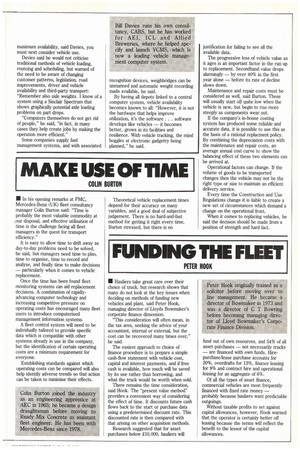FUNDING THE FLEET
Page 41

If you've noticed an error in this article please click here to report it so we can fix it.
PETER HOOK • Hauliers take great care over their choice of truck, but research shows that many do not look at the key issues when deciding on methods of funding new vehicles and plant, said Peter Hook, managing director of Lloyds Bosvmaker's corporate finance dimension.
"This consideration will often mean, in the tax area, seeking the advice of your accountant, internal or external, but the cost can be recovered many times over," he said.
The easiest approach to choice of finance procedure is to prepare a simple cash-flow statement with vehicle cost, capital and interest payments, and if free cash is available, how much will be saved by its use rather than borrowing, and what the truck would be worth when sold.
There remains the time consideration, said Hook. The "present value method" provides a convenient way of considering the effect of time. It discounts future cash flows back to the start or purchase data using a predetermined discount rate. This discounted rate is then compared with that arising on other acquisition methods.
Research suggested that for asset purchases below £10,000, hauliers will fund out of own resources, and 54% of all asset purchases — not necessarily trucks — are financed with own funds. Hirepurchase/lease purchase accounts for 20%, overdrafts for 13%, finance leasing for 9% and contract hire and operational leasing for an aggregate of 6%.
Of all the types of asset finance, commercial vehicles are most frequently financed with fixed rate money — probably because hauliers want predictable outgoings.
Without taxable profits to set against capital allowances, however, Hook warned that the operator is certainly better off leasing because the terms will reflect the benefit to the lessor of the capital allowances.












































































































